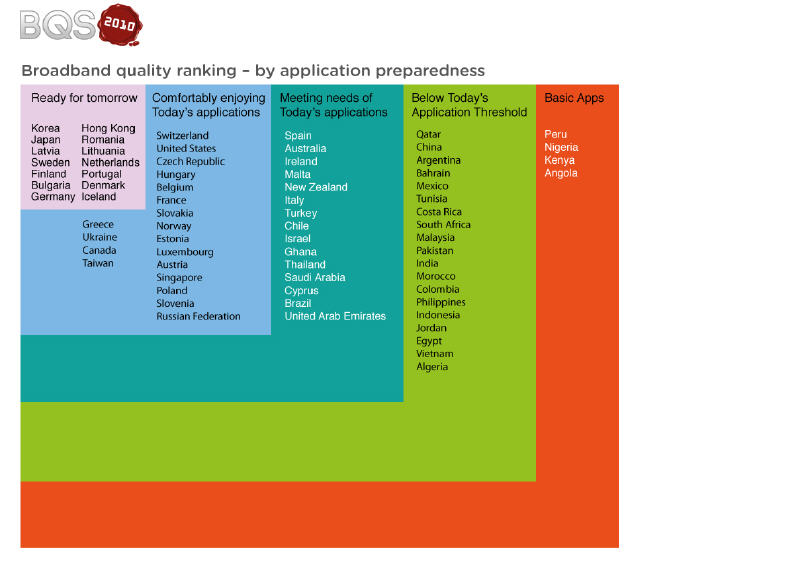Ireland has moved rapidly from the fringes of the online world and is now ranked 13th out of 72 nations, according to the latest Cisco Global Broadband Study by Oxford’s Said Business School.
The country’s download speeds have improved 35pc since last year and 87pc since 2008, said Kim Majerus, managing director, Cisco Ireland.
According to the Cisco study, Ireland is now rated as a country whose network is “meeting the needs of today’s applications.”
However, the country isn’t among the 14 countries who are “ready for the applications of tomorrow.”
Ireland is ranked 22nd in terms of mobile broadband quality scores.
“This improvement”, said Minister for Communications Eamon Ryan TD, “is a reflection of the Government’s progressive broadband policy, which encourages collaboration as well as competition. In the last two years, Ireland has seen a spike in broadband improvement, bringing to an end the legacy of under investment of the early 2000s.
“In two years, €1.5bn of public and private monies have been invested in our broadband networks and services. Broadband subscriptions have more than doubled from 600,000 to 1.5 million.
“We are among the top European countries for broadband leadership, ahead of France, Germany, Spain and the UK, and we must build on this. Service providers here are already beginning to deliver the 100-megabit connections in 2010 that Europe is seeking for 2020. On access, we are two years ahead of the EU’s target for nationwide availability, with the National Broadband Scheme nearing completion,” Ryan said.
The global picture
Overall, thanks to a range of investments in infrastructure, global broadband quality has improved by 50pc in just three years and penetration of broadband continues to improve, with about half of the households (49pc) of the countries investigated now having access to broadband (up from 40pc in 2008).
Using the data from 40 million real-life broadband quality tests conducted in May-June of 2010 on the internet speed testing site, speedtest.net, the researchers were able to evaluate the broadband quality of 72 countries around the globe.
Quality was evaluated by scoring the combined download throughput, upload throughput, and latency capabilities of a connection, the key criteria for a connection’s ability to handle specific internet applications, from consumer telepresence to online video and social networking.
These criteria are expressed as a single ‘Broadband Quality Score’ for each country. By combining this Broadband Quality Score with broadband penetration figures for each country (ie, the proportion of households who have access to broadband, obtained from Point Topic in 2010), the researchers were able to map out the world’s broadband leaders – those with the best combination of broadband quality and penetration.
Building on last year’s study, the 2010 data also includes analysis of the broadband quality of 239 cities, providing further insight into the evolution of smart, connected communities around the world.
The study was conducted by a team of MBA students from the Saïd Business School at the University of Oxford and the University of Oviedo’s Department of Applied Economics, and sponsored by Cisco.
Increases in broadband quality
Overall, broadband quality has increased by 48pc since 2008 (although some countries have shown significantly larger improvements):
The average global download speed has increased 49pc in just three years (3,271 Kbps in 2008, 4,882 Kbps in 2009 and 5,920 Kbps in 2010).
The average global upload speed has increased 69pc in three years (794 Kbps in 2008, 1,345 Kbps in 2009. 1,777 Kbps in 2010).
Average latency has fallen by 25pc to 142ms. This is slightly up from 140ms in 2009, but still significantly lower than 189ms in 2008.
Fourteen countries are already prepared for the “internet applications of tomorrow”, such as high-definition internet TV and high quality video communications services (consumer telepresence) which are expected to become mainstream in just a few years.
These countries are South Korea, Japan, Latvia, Sweden, Bulgaria, Finland, Romania, Lithuania, Netherlands, Hong Kong, Germany, Portugal, Denmark and Iceland. This is up from nine countries in 2009 and just one in 2008 (Japan). Nevertheless, Latvia, Bulgaria, Romania and Lithuania have limited penetration rates compared to the others.
With 100pc broadband penetration, South Korea tops the broadband leadership ranking for the second year in a row. Broadband quality in South Korea is ranked the highest and has set a new benchmark for the world. Average download throughput is 33.5 Mbps, an increase of 55pc from 2009, average upload throughput is 17 Mbps, an increase of 430pc, and average latency is 47ms, an improvement of 35pc vs 2009 figure.
Other key facts:
- Hong Kong, Iceland, South Korea, Luxemburg and Malta lead in broadband penetration with takeup reaching 100pc of households
- 49pc of the households of all the countries studied have access to broadband, up from 40pc in 2008 and 47pc in 2009
- Half of the countries show no digital divide in the quality of broadband (ie, between their main cities and outside them), a 38pc increase from 2009
- There are already 38 cities with the broadband quality required to become smart and connected communities; 18 of those are in Western Europe, 11 in Eastern Europe, seven in Asia, and one in the USA
- Seoul tops the list of cities with the highest broadband quality (scoring 97 out of 100)
- Japan stands out as having the most cities with the highest broadband quality in the world, with three cities, Nagoya, Yokohama and Osaka rated second, third and fourth respectively
- Latvia has the largest gap between the quality in its main cities and those regions outside, while Japan has the largest positive gap where the quality outside its main cities is actually generally better than in the main cities
